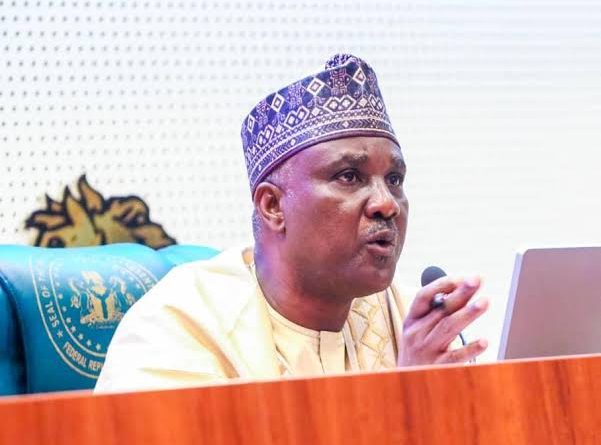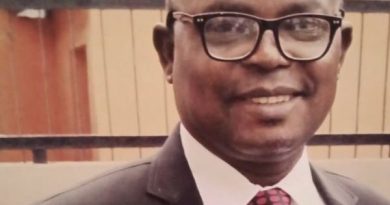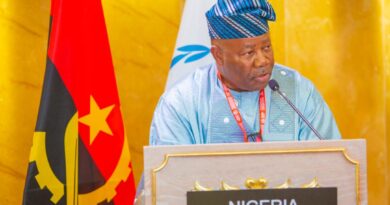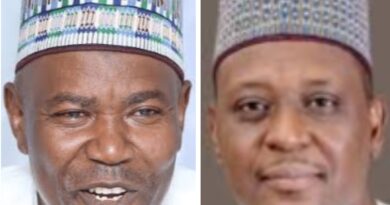Compulsory Voting Bill: A Wild Goose Chase-By Bolanle BOLAWOLE
turnpot@gmail.com 0705 263 1058
A compulsory voting bill is said to have passed the second reading stage at the National Assembly. The aim of the bill is to compel every Nigerian of voting age to vote during elections; failure of which punitive measures would be taken against violators. The youths form the majority of Nigeria’s population and, tell me, how many of these GenZ or Alpha generations are interested in voting – even in the country itself! As per the Electoral Act 2010, the voting age in Nigeria is 18 years. So, the “catchment area” of the proposed law, so to say, are the youths. Get ready, then, for #ENDCOMPULSORYVOTINGNOW campaign, probably in the same fashion as #ENDSARSNOW campaign !
If the bill becomes law – though its journey in that regard is still long and tortuous – anyone of voting age who fails or refuses to vote will be liable to whatever penalty is stipulated by the law. Elementary Civics describes voting as a civic responsibility or duty which a good, responsible, and responsive citizen is expected to discharge enthusiastically and without compulsion. That being the case, why do we need a law to compel observance? Some will argue that this is because not all citizens are good and not all are aware of the importance of their discharging this onerous responsibility, especially in a country where illiteracy is rife and political education is low.
There are other reasons why citizens may consciously – and as a deliberate political action – choose not to vote. Indeed, political apathy, rather than being apolitical, may, in fact, qualify as one of the highest and most informed forms of political action. We shall soon return to this.
The reason why a compulsory voting bill may be tenable these days is because we operate what is known as universal adult suffrage; meaning that everyone – male or female, serf or freeborn, wise or foolish- has the vote. It was not so in times past. Through the ages nobility, property rights, gender, nationality, residency, age, tax and income requirements, educational qualifications, among others, were the qualifications that determined who possessed the rights to vote and be voted for. In Nigeria, for example, while women in the south gained voting rights in 1954, their northern counterparts did not gain theirs until the Second Republic in 1979.
The current struggle is for the Diaspora Nigerians to be able to vote, a right long enjoyed by over 110 countries, not less than 23 of them being African. It is an embarrassment that the self-proclaimed “Giant of Africa” is yet to attain this milestone. Extending the vote to Nigerians in the Diaspora appears a more feasible project than the wild goose chase of compelling Nigerians of voting age to vote, willy-nilly. How many millions of such Nigerians do we know exist? And how do we enforce the law? If we have found it practically impossible to enforce the law against election malpractice – selling and buying of votes, election rigging and thuggery, falsification of election results, etc – which usually involve a lesser number of people who can be easily identified and apprehended, how do we go about arresting and penalying people who can simply stay in the comfort of their homes and shun the voting centres?
All over the world, it is not everyone who registers to vote in an election that turns out to vote. And this, if you may care to know, is in exercise of their fundamental human rights of freedom of movement (to go or not go to a polling station) as well as freedom of association (to associate or not associate with a political party or group)! The level of voter participation on election day varies from place to place.
Voter participation is a barometer employed to gauge the health of the political system. The higher the level of voter participation, the healthier the country’s political system and vice-versa. Where voter turnout is massive and a candidate in an election polls a commanding number of votes, he/she is said to be popular and his/her government is likely to enjoy the support and confidence of the people.
The popularity of candidates in an election and or of governments is, however, not static. A popular candidate or government today may become unpopular tomorrow or over time. In the case of former United States President Joe Biden, his health issues, which came stubbornly to the fore during his lacklustre debate performance against then challender Donald Trump, caused his popularity rating to dip abysmally, prompting him to eventually quit the presidential race.
On the other hand Trump, whose popularity soared, leading him to win the election with a landslide, had since seen his popularity rating drop as a result of controversial policies that have alienated a chunk of his support base. In Nigeria, former President Muhammadu Buhari rode into the presidency on the crest of huge popularity but left as one of the most derided Nigerian leaders ever, as a result of incompetent and ineffective leadership.
So many factors account for political apathy; such that law alone cannot cure the malaise. Let us now take a look at the various segments of eligible voters who do not vote: the first set are the ignorant. These ones do not know that it is their duty or right to vote. They do not also know the advantages involved and the grave dangers to themselves and the polity of their indifference. Literacy and political education, not law, is what this group of eligible voters need.
The second set are those who are willing to vote but circumstances beyond their control, such as insecurity and economic hardship, constrain them. What this group needs is not a law compelling them but policies that will remove the roadblocks on their way to the polling station.
The third set are those who want to vote but the bureaucracy, rep-tape and corruption of INEC and other agencies involved in the electoral process would not let them. They registered but could not collect their Permanent Voter’s Card. Getting to the polling station, the card reader or whatever would not let them cast their vote. What is needed here, again, is not a law compelling voting but for the authorities concerned to organise a seamless electoral process.
Another group of voters who keep a safe distance from the polling station are those who fear for their life because of the activities of political thugs who constitute themselves into laws unto themselves. Most of the time, even the presence of law enforcement agents does not deter those roughnecks and their sponsors.
Do votes count in Nigeria? There are lots of Nigerians who believe that going to vote is a waste of precious time and energy. Elections are mindlessly rigged. Results are falsified. The winners as well as losers are known well before votes are cast. And the voter is powerless – from the polling booth right to the highest court of the land. So, why waste your time – and risk your life – for nothing? Will the compulsory voting law excise that cancer?
From experience, many Nigerians have come to the conclusion that all the politicians are the same – liars, pretenders, looters, wicked and selfish people – who are going into office to feather their own nests and not serve the interest of the people. So, why help them; why give them the stamp of legitimacy of saying they were elected into office?
There is another group who does not believe in the political system in operation. This group wants a return to the parliamentary system of government. To them, the present presidential system is too expensive, too wasteful, and too brazenly corrupt: Change it or else they wont come out to vote!
Another group of Nigerians believe that what the country needs before any election is restructuring. Without that, they believe you are only putting the cart before the horse.
Of course, then, there are Nigerians who have lost all confidence in Nigeria as a country. They want the country dismembered. Their battle cry is: To your tents, O Israel! The Biafrans want Biafra. The Yoruba want Oodua or Yoruba Nation, etc. No law promulgated by the National Assembly will move those ones to line up to vote for what they derogatorily call the Lugardian (ill-fated) experiment (which, as far as they are concerned, expired in 2014, the 100th anniversary of Frederick Lugard’s amalgamation of southern and northern British protectorates ofNigeria).
Finally, the proponents of the proposed compulsory voting law appear to erroneously think that voter apathy is non-voting; it is not! Voter apathy is one of the many options available to eligible voters: they can decide to vote for this or that party or candidate. They can get to the polling booth – in the event that they are forced to – and void their vote. They can also stay clear of the polling booth and the entire political process – in which case they are voting against the system as a whole. Each and every one of these voting options have far-reaching political implications.
While the intentions of the promoters of the compulsory voting law may be altruistic, their one-medicine-cures-all proposition will fall flat on its face on the field of play, even if it scales through in the hallowed chambers of the National Assembly and the President assents to it.
FEEDBACK
JAMB: They want to kill CBT before it reaches SSCE!
Let’s not play dumb! Just a few days after the Minister of Education went on air to announce that WAEC and NECO will go CBT by November, JAMB, the poster child of successful CBT exams in Africa, suddenly had its biggest technical failure in over a decade. Call it coincidence. I call it coordinated. Because what you just witnessed might not be a crash. It might be a warning!
Let’s break it down: The Minister announced CBT expansion and the system failed immediately after! The Education Minister said it clearly: “JAMB conducts its exams using a computer-based testing system. They’ve implemented strong security measures and, as a result, fraud or cheating has been nearly eliminated.” Translation? No more miracle centers. No more leaked question papers. No more impersonation networks. No more “special arrangements.” It was a bold move toward sanitizing Nigeria’s broken education system.
But barely a week later: JAMB goes dark. System failure. National headlines. Mass panic. The very exam body they were using as a reference point publicly collapsed! Too perfect. Too fast. Too suspicious. Miracle centers are not ready to die. Understand this: Exam malpractice is not just cheating. It’s an economy. An entire shadowy industry is built around it.
Now imagine NECO and WAEC switching to CBT: You just killed a billion-naira black market! Do you really think they’ll sit and clap? No. They’ll sabotage the blueprint—before it scales through. And JAMB was the target. So what’s the fastest way to stop the government from replicating JAMB’s model? Make JAMB look unreliable.
Let’s not be naïve… There are powerful people whose entire revenue streams depend on keeping education corrupt. They will fight reforms like their life depends on it. Because, for many of them, their life does, in fact, depend on it. – O. M. O. Oludoye.
Former editor of PUNCH newspapers, Chairman of its Editorial Board and Deputy Editor-in-chief, BOLAWOLE was also the Managing Director/Editor-in-chief of The Westerner news magazine. He writes the ON THE LORD’S DAY column in the Sunday Tribune and TREASURES column in New Telegraph newspaper on Wednesdays. He is also a public affairs analyst on radio and television.




